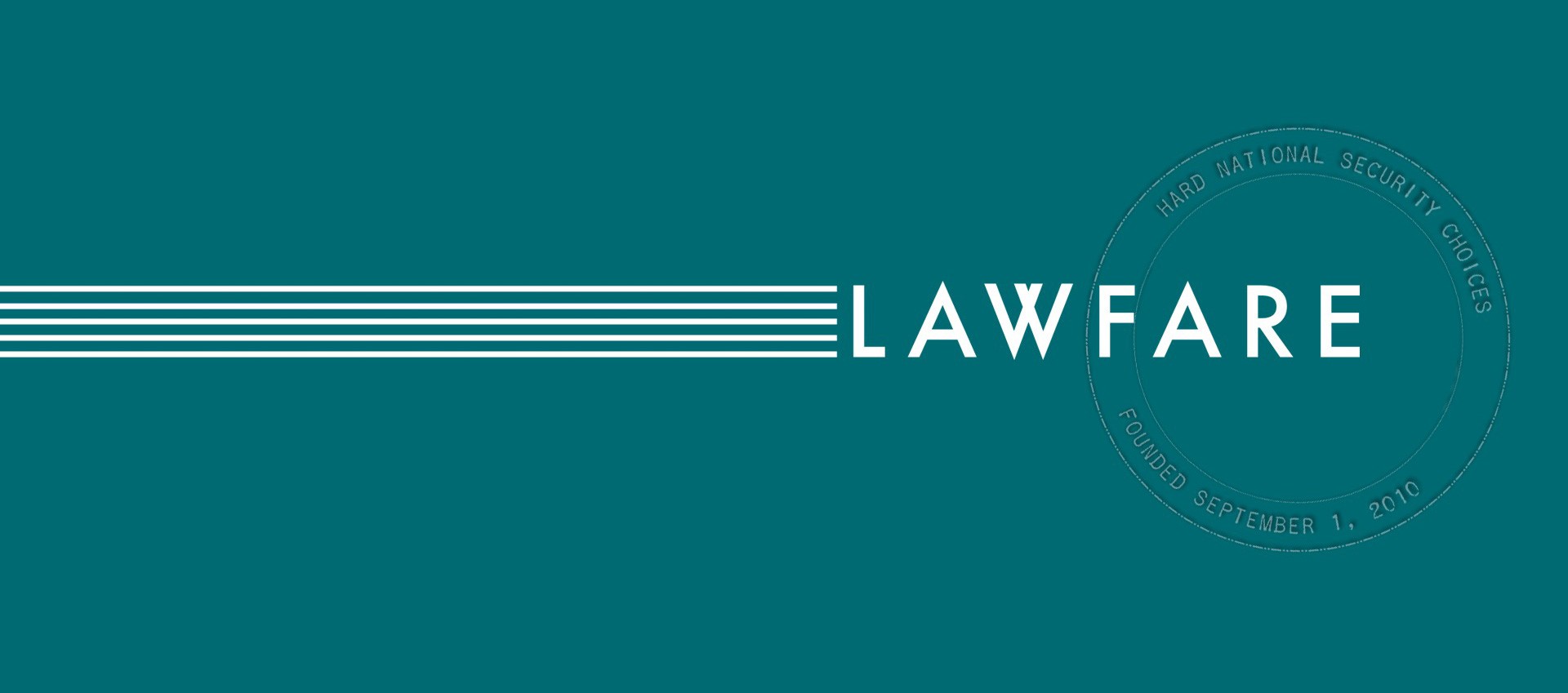The Week That Was: All of Lawfare in One Post

Published by The Lawfare Institute
in Cooperation With

Hyemin Han and Caleb Benjamin shared the U.S. Supreme Court’s order granting former President Donald Trump’s petition for writ of certiorari on Jan. 5 and Trump's petition for writ of certiorari filed on Jan. 3. Lawfare will track the Supreme Court's docket on the Trump Disqualification Tracker as the case progresses.
On Jan. 6, Lawfare will release the first episode of Season 2 of The Aftermath, a narrative podcast series on the government’s response to the Jan. 6 attack on the U.S. Capitol. The episode, entitled “The Grossly Impudent Lie,” tells the story of how Trump, Rudy Giuliani, and their allies spun a web of lies to justify their attempts to overturn the results of the 2020 election—and the various mechanisms deployed to hold them accountable.
On this week’s episode of “Lawfare Live: Trump’s Trials and Tribulations,” Benjamin Wittes sat down with Anna Bower and Roger Parloff to discuss Trump’s petition for cert in the Colorado Section 3 disqualification case, the status of the special counsel’s case in D.C., Fulton County updates, and more:
Katherine Pompilio shared a panel for the U.S. Court of Appeals for the D.C. Circuit’s ruling upholding a 12-month prison sentence handed down to Jan. 6 defendant Russell Alford.
Anna Hickey shared a lawsuit seeking to disqualify Rep. Scott Perry (R-Pa.) from his district’s 2024 primary ballot under Section 3 of the 14th Amendment.
Hickey shared the minority staff on the House Oversight Committee’s report detailing how businesses owned by Trump received millions of dollars from at least 20 foreign governments while he was president.
Marc Garlasco analyzed a statement delivered by the chief of staff of the Israeli Air Force (IAF) Brig. Gen. Omer Tischler on IAF operational choices in the war in Gaza and their legality.
On the Lawfare Podcast, Natalie Orpett sat down with Gabor Rona to discuss what international humanitarian law (IHL) has to say about the most heated debates of the Israel-Hamas war, including the high number of civilian casualties in Gaza and Hamas’s use of human shields, the gaps in IHL, and whether the law even matters here:
Han shared South Africa’s application to the International Court of Justice initiating proceedings against Israel for alleged breaches of the “Genocide Convention.”
James Kraska argued that the U.S. should conduct strikes on Houthi infrastructure and discussed how such strikes would be legal under international law on the use of force in self-defense.
Austin Doctor summarized terrorist activity in 2023 and discussed the threats the United States should be prepared for in 2024.
Matt Gluck shared a Justice Department complaint charging a U.S. citizen, Karrem Nasr, for attempting to provide “material support or resources” to al-Shabaab.
Danielle Dougall and James Ostrowski summarized the Executive Order on the Safe, Secure, and Trustworthy Development and Use of Artificial Intelligence (AI) signed by President Joe Biden in October 2023.
Amos Toh discussed several harmful AI algorithms utilized by essential government services and argued for legislation regulating AI and banning uses of AI that pose serious risks to people’s rights.
Gregory Smith discussed how imposing license requirements at strategic points in the frontier AI lifecycle may be an effective form of AI regulation if done by a properly resourced regulatory body with technical expertise.
Markus Anderljung and Anton Korinek proposed a number of safety standards for companies in the frontier AI development industry to adopt and outlined multiple potential building blocks for a government AI regulatory regime.
Hickey shared a new Justice Department indictment of Sen. Bob Menendez (D-N.J.) that alleges Menendez used his political influence to benefit the government of Qatar.
On Rational Security, Scott R. Anderson and Quinta Jurecic sat down with Bower to discuss the killing of a senior Hamas official in Beirut, updates in the special counsel’s case against Trump, the charges brought against Menendez, and more:
Elizabeth Kimber reviewed Amy B. Zegart’s book “Spies, Lies, and Algorithms: the History and Future of American Intelligence,” (Princeton University Press, 2022). The review examines Zegart’s analysis of how the intelligence community has adapted to technological change and the similarities between Zegart’s recommendations for strengthening ties between the intelligence community and the private sector and new U.S. government policies.
On the Lawfare Podcast, in an edition of Arbiters of Truth, Lawfare’s series on the information ecosystem, Jurecic sat down with Ramya Krishnan, Mary-Rose Papandrea, and Matt Perault to discuss a preliminary injunction issued by a federal district judge finding that the Montana’s TikTok ban likely violated the First Amendment and a decision by a federal judge in Texas upholding a more limited ban against the use of TikTok on state-owned devices:
On the Lawfare Podcast, Tyler McBrien sat down with Jake Bittle to discuss what makes the Marshall Islands’ climate adaptation plan particularly revolutionary, the thorny geopolitics of climate financing, the unquantifiable loss that might occur should the worst case scenarios come to fruition for the Marshallese, and more:
On the Lawfare Podcast, Lawfare senior editors sat down to answer listener-submitted questions about the news that defined 2023, including questions on the Israel-Gaza War, military aid to Ukraine, the Trump trials, and more:
And on Chatter, David Priess sat down with Vincent Bevins to discuss why mass protests between 2010 and 2020 so often fell short of their objectives, the principle of horizontalism, the role of social media in mobilization and action, and more:
And that was the week that was.



